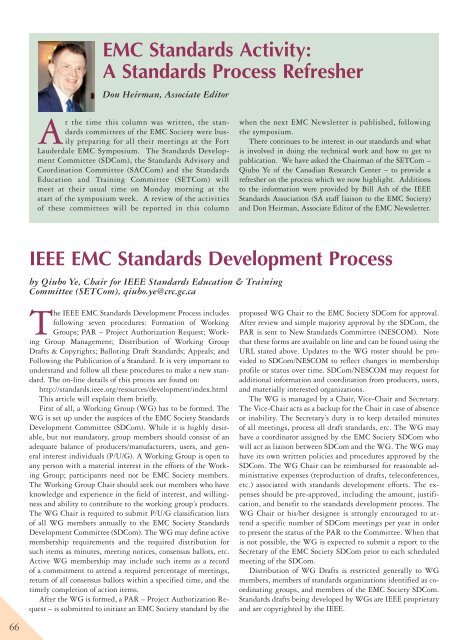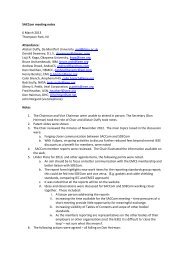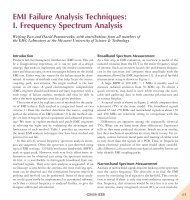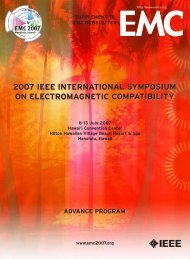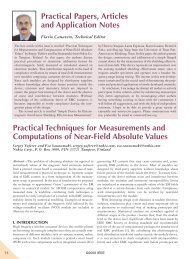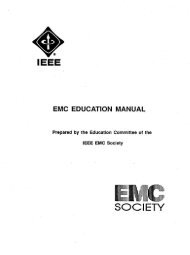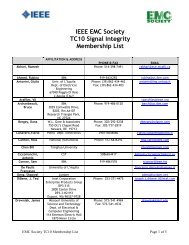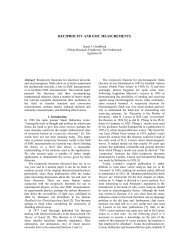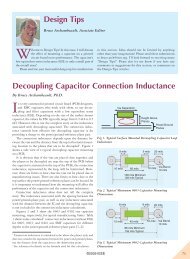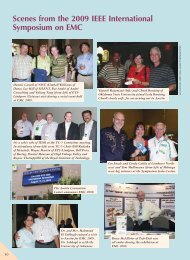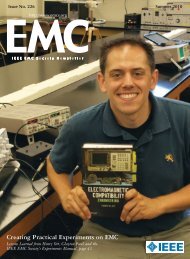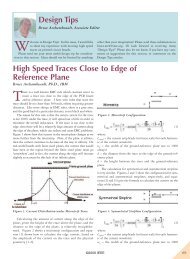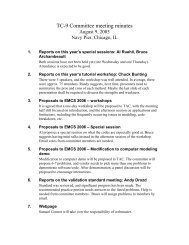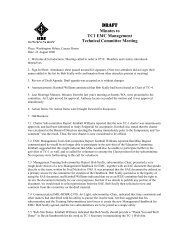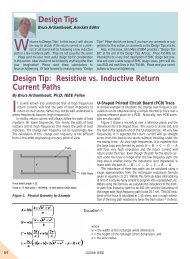Tutorial: EMC & Signal Integrity using SPICE, page 44 - IEEE EMC ...
Tutorial: EMC & Signal Integrity using SPICE, page 44 - IEEE EMC ...
Tutorial: EMC & Signal Integrity using SPICE, page 44 - IEEE EMC ...
You also want an ePaper? Increase the reach of your titles
YUMPU automatically turns print PDFs into web optimized ePapers that Google loves.
66<br />
<strong>EMC</strong> Standards Activity:<br />
A Standards Process Refresher<br />
Don Heirman, Associate Editor<br />
At the time this column was written, the standards<br />
committees of the <strong>EMC</strong> Society were busily<br />
preparing for all their meetings at the Fort<br />
Lauderdale <strong>EMC</strong> Symposium. The Standards Development<br />
Committee (SDCom), the Standards Advisory and<br />
Coordination Committee (SACCom) and the Standards<br />
Education and Training Committee (SETCom) will<br />
meet at their usual time on Monday morning at the<br />
start of the symposium week. A review of the activities<br />
of these committees will be reported in this column<br />
The <strong>IEEE</strong> <strong>EMC</strong> Standards Development Process includes<br />
following seven procedures: Formation of Working<br />
Groups; PAR – Project Authorization Request; Working<br />
Group Management; Distribution of Working Group<br />
Drafts & Copyrights; Balloting Draft Standards; Appeals; and<br />
Following the Publication of a Standard. It is very important to<br />
understand and follow all these procedures to make a new standard.<br />
The on-line details of this process are found on:<br />
http://standards.ieee.org/resources/development/index.html<br />
This article will explain them briefly.<br />
First of all, a Working Group (WG) has to be formed. The<br />
WG is set up under the auspices of the <strong>EMC</strong> Society Standards<br />
Development Committee (SDCom). While it is highly desirable,<br />
but not mandatory, group members should consist of an<br />
adequate balance of producers/manufacturers, users, and general<br />
interest individuals (P/U/G). A Working Group is open to<br />
any person with a material interest in the efforts of the Working<br />
Group; participants need not be <strong>EMC</strong> Society members.<br />
The Working Group Chair should seek out members who have<br />
knowledge and experience in the field of interest, and willingness<br />
and ability to contribute to the working group’s products.<br />
The WG Chair is required to submit P/U/G classification lists<br />
of all WG members annually to the <strong>EMC</strong> Society Standards<br />
Development Committee (SDCom). The WG may define active<br />
membership requirements and the required distribution for<br />
such items as minutes, meeting notices, consensus ballots, etc.<br />
Active WG membership may include such items as a record<br />
of a commitment to attend a required percentage of meetings,<br />
return of all consensus ballots within a specified time, and the<br />
timely completion of action items.<br />
After the WG is formed, a PAR – Project Authorization Request<br />
– is submitted to initiate an <strong>EMC</strong> Society standard by the<br />
when the next <strong>EMC</strong> Newsletter is published, following<br />
the symposium.<br />
There continues to be interest in our standards and what<br />
is involved in doing the technical work and how to get to<br />
publication. We have asked the Chairman of the SETCom –<br />
Qiubo Ye of the Canadian Research Center – to provide a<br />
refresher on the process which we now highlight. Additions<br />
to the information were provided by Bill Ash of the <strong>IEEE</strong><br />
Standards Association (SA staff liaison to the <strong>EMC</strong> Society)<br />
and Don Heirman, Associate Editor of the <strong>EMC</strong> Newsletter.<br />
<strong>IEEE</strong> <strong>EMC</strong> Standards Development Process<br />
by Qiubo Ye, Chair for <strong>IEEE</strong> Standards Education & Training<br />
Committee (SETCom), qiubo.ye@crc.gc.ca<br />
proposed WG Chair to the <strong>EMC</strong> Society SDCom for approval.<br />
After review and simple majority approval by the SDCom, the<br />
PAR is sent to New Standards Committee (NESCOM). Note<br />
that these forms are available on line and can be found <strong>using</strong> the<br />
URL stated above. Updates to the WG roster should be provided<br />
to SDCom/NESCOM to reflect changes in membership<br />
profile or status over time. SDCom/NESCOM may request for<br />
additional information and coordination from producers, users,<br />
and materially interested organizations.<br />
The WG is managed by a Chair, Vice-Chair and Secretary.<br />
The Vice-Chair acts as a backup for the Chair in case of absence<br />
or inability. The Secretary’s duty is to keep detailed minutes<br />
of all meetings, process all draft standards, etc. The WG may<br />
have a coordinator assigned by the <strong>EMC</strong> Society SDCom who<br />
will act as liaison between SDCom and the WG. The WG may<br />
have its own written policies and procedures approved by the<br />
SDCom. The WG Chair can be reimbursed for reasonable administrative<br />
expenses (reproduction of drafts, teleconferences,<br />
etc.) associated with standards development efforts. The expenses<br />
should be pre-approved, including the amount, justification,<br />
and benefit to the standards development process. The<br />
WG Chair or his/her designee is strongly encouraged to attend<br />
a specific number of SDCom meetings per year in order<br />
to present the status of the PAR to the Committee. When that<br />
is not possible, the WG is expected to submit a report to the<br />
Secretary of the <strong>EMC</strong> Society SDCom prior to each scheduled<br />
meeting of the SDCom.<br />
Distribution of WG Drafts is restricted generally to WG<br />
members, members of standards organizations identified as coordinating<br />
groups, and members of the <strong>EMC</strong> Society SDCom.<br />
Standards drafts being developed by WGs are <strong>IEEE</strong> proprietary<br />
and are copyrighted by the <strong>IEEE</strong>.


